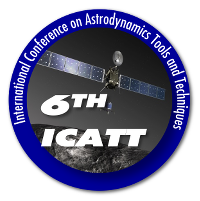Speaker
Michael Johnson
(Imperial College London)
Description
With the dramatic increase in rideshare opportunities for CubeSats and other small spacecraft, landers and rovers, platforms offering to fly large numbers of virtual payloads, and projects to manufacture spacecraft-on-demand on orbit by the thousand, discovery and planning of trajectories for actual and potential space objects is becoming a bottleneck. Multiple organisations have, or are planning, projects that require the launch and calculation of trajectories for hundreds to hundreds of thousands of space systems to be sourced and managed over the next decade.
To address this issue, we propose Uniform Trajectory Locators (UTLs), an open specification for a web based representational state transfer (RESTful) application programming interface (API) permitting the manual and automated discovery of existing, upcoming or potential trajectories for use by new and existing, virtual and physical, space systems and payloads.
UTLs permit the distributed decentralized publishing of trajectories of space objects, whether launch opportunities, existing spacecraft in orbit, or potential opportunities for deployment in low earth orbit, in interplanetary space or on planetary bodies. As well as publishing existing opportunities, UTLs can be used to request trajectory solutions from domain specialists and automated tools, permitting production and operations schedulers responsible for sourcing and managing the launch and operation of constellations of satellites and exploration tools to autonomously search for optimal solutions for missions.
UTLs build on existing web standards such as Uniform Resource Locators (URLs) and eXtensible Markup Language (XML), and return results in an object orientated Trajectory Markup Language (TML). UTLs are designed to permit different levels of truth and detail to be returned by their publishers to consumers by tools ranging in complexity from static text files to sophisticated algorithmic back ends. The level of detail and information provided about the same trajectory by different stakeholders (e.g. launch providers, brokers, potential consumers, space situational awareness providers, etc.) can be substantially different for commercial, political, technical or temporal reasons. The same trajectory can be published by multiple independent distributed providers with a security and transaction model allowing consumer by consumer level information disclosure and automated electronic trading of access to trajectories. UTLs can be used to provide lightweight wrappers around existing tools to provide platform independent interfaces to existing databases of launch opportunities, orbital parameters and flight dynamics tools.
A variety of demonstration proof of concept UTL tools and data sources under development with academic and commercial space systems providers will be presented, with a focus on sub-kilogram scale platforms supporting the mass exploration of space for science, education and commerce.
| Applicant type | First author |
|---|
Primary author
Michael Johnson
(Imperial College London)
Co-author
Prof.
Julie McCann
(Imperial College London)

